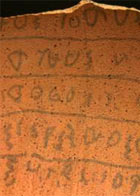Asia
 Lost & Found
Lost & FoundTuesday, January 4, 2011 by Aryeh Tepper | Jewish Ideas Daily » Daily Features
In 1974, a strange letter from northeastern India landed on the desk of Israel's then Prime Minister Golda Meir. It was sent by a group of Indians claiming to be descendants of the biblical tribe of Menashe.
 The Mad Mystic of Bratslav
The Mad Mystic of BratslavMonday, November 1, 2010 by Allan Nadler | Jewish Ideas Daily » Daily Features
Rabbi Nahman of Bratslav (1772-1811) is the strangest and most paradoxical leader in the history of Hasidism, and one of its most original, albeit mad, geniuses. Nahman has been an object of both literary fascination and considerable scholarly research. He also shares center stage with Franz Kafka (1888-1924) in Rodger Kamenetz's Burnt Books.
 The Azeri Exception
The Azeri ExceptionFriday, October 29, 2010 by Aryeh Tepper | Jewish Ideas Daily » Daily Features
Someone forgot to tell the republic of Azerbaijan that Jews and Muslims cannot live together in peace. Somewhere between twenty and forty thousand Jews reside in that Shiite country, which sits on Iran's northern border and enjoys diplomatic, economic, and military ties with Israel. Can this last, and for how long?
 Limited Partnership
Limited PartnershipMonday, August 16, 2010 by Elliot Jager | Jewish Ideas Daily » Daily Features
Celebrating its Independence Day on August 15, the nation of India marked 63 years since the end of British rule in the sub-continent. In light of the two countries' more or less contemporaneous struggle for self-determination in the immediate aftermath of World War II, one might have thought that India would establish close ties with the newly born state of Israel straightaway. It did not happen.
 Words
WordsMonday, March 8, 2010 | Jewish Ideas Daily » Daily Features
One of the potentially deleterious effects of the digital revolution is a flattening of consciousness—or so some fear. What sort of leveling takes place as we click relentlessly through the endless web? At what point do the words—thoughtful, meaningless, moving, inane—all bleed together? How to maintain any sense of the preciousness of language itself? Several texts recently come to light manage, each in its own way, to remind us that a whole, irreplaceable world can rest in a few furtive lines found who knows where. Phrases inked on pottery discovered at an excavation in Israel have been dated to the late-11th or early-10th...
 China
ChinaMonday, February 8, 2010 | Jewish Ideas Daily » Daily Features
Quite apart from the implications of China's growing influence in the global economy, China's politics, both domestic and foreign, clash directly with Western concerns in areas from democracy to the rights of individuals and minorities to (especially when it comes to Iran's race to acquire nuclear weapons) the security of Europe and the Middle East. China is also interested in the Jews. It has had diplomatic relations with Israel since 1992, and Jerusalem has risked Washington's displeasure to maintain its military ties with Beijing. And China's interest extends beyond Israel, to Jewish civilization as a whole. Chinese scholars and academics seek to...
 The Harshness of Creation
The Harshness of CreationLike the 2004 tsunami that devastated southeast Asia, yesterday's catastrophic earthquake in Haiti, a poverty-stricken country with a legacy of home-grown violence and suffering, inevitably provoked the terrible question: where was God? One answer derives from Jewish religious sources, and specifically from the teachings of the Kabbalah. It has to do with tzimtzum, or contraction: that is, God's own contraction and limitation of Himself in order to make space for the finite—and invariably flawed—worlds of physical nature and human action. The idea was most famously developed in Safed, Palestine by the 16th-century kabbalist Isaac Luria as part of a complicated, esoteric myth...
Editors' Picks
Analyzing Iran's Attacks Anshel Pfeffer, Haaretz. This week's attacks by Iran's proxies on Israeli diplomats in India, Georgia, and Thailand have been strategically located in countries with which Israel is building diplomatic and military ties.
Allies in Azerbaijan Tim Judah, Jewish Chronicle. Sharing intelligence and trading defense hardware for oil, Israel has quietly built a strategic alliance with Azerbaijan, and thus joined Europe, Russia, Turkey, and Iran in the competition for the Caucasus.
Building Bridges Noam Dvir, Haaretz. Moshe Safdie, the world-renowned Israeli architect, is shutting down the office he opened in Jerusalem in 1970. The future, it seems, is in China.
"Subbotniks" Eli Ashkenazi, Haaretz. In 1876, a community of converts left their native Russia to settle in the Galilee, forsaking their Christian past. Now their descendants are rediscovering their roots.
Courting China Jerusalem Post. Given its erstwhile alliance with the Arab nations and current support for Iran, China is not Israel's most likely partner. Yet economic ties between Israel and China have never been stronger.
Land of the Rising Zun Ross Perlin, Forward. It was a stray reference to Kafka's obsession with Yiddish theater that started Kazuo Ueda down the path that led to his creation of an implausible opus: the world's first Yiddish-Japanese dictionary.
Israel's Indian Connection Marc Sloman, Ynet. The highest-ranking Indian official in a decade is about to visit Israel. His trip is another step in India's 20-year journey out of Third World socialism.
Japan's Inner Israel Glenn Newman, Japan Times. Both Japan and Israel rose from deprivation to prosperity in, historically speaking, the blink of an eye. But now Israel is punching far above its economic weight, while Japan can't seem to get off the mat. What happened?
Why China and Russia Help Iran Richard Weitz, Diplomat. Both countries have diplomatic interests in Iran's continued alienation from the West, and both have benefited economically from the reluctance of Western companies to invest in Iran.
When Einstein Met Tagore Gary Shapiro, Forward. It was staged to be a media sensation when "the thinker with the head of a poet" met "the poet with the head of a thinker." But on philosophical matters, the two titans stood poles apart.

